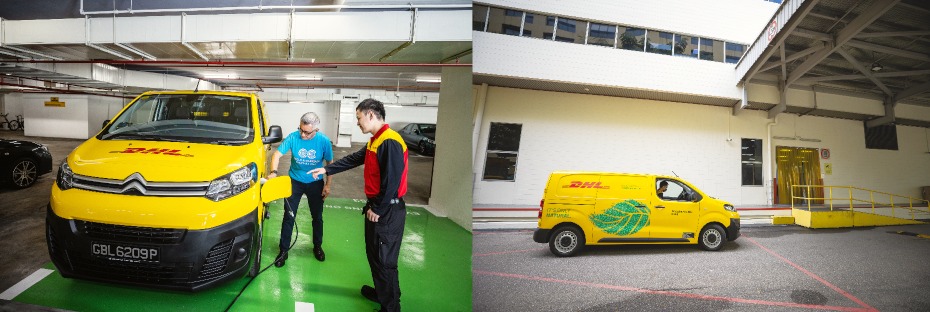Grow your business with the Discover newsletter
Logistics advice & insights straight to your inbox
Subscribe now
In today’s time, environmental sustainability is critical. As automobile emissions are already contributing significantly to climate change, the need to create a greener and more sustainable planet is becoming increasingly urgent. DHL, a significant player in the last-mile delivery industry, has set new targets and programmes as part of a larger plan to incorporate sustainable practices into delivery.
Early on in the year, DHL Express added six Citroën ë-Dispatch electric panel vans to their fleet. The Citroën ë-Dispatch van, which was released in November 2021, is driven by an all-electric, zero-emissions powertrain and clever technology that provides increased convenience and environmental friendliness. The vehicle is projected to aid DHL Express in achieving significant reductions in both carbon emissions and operating costs. It also closely aligns with the organization’s Mission 2050 which aims to have zero emissions by the year 2050. For a logistics giant, this is an ambitious but important goal to help combat climate change.
To quote Christopher Ong, the Managing Director of DHL Express Singapore, “There has been a noticeable change in EV viability in real-world operations since DHL Express Singapore deployed its first electric vehicle in 2019.” DHL Express is all set to leverage the benefits offered by Citroën ë-Dispatch in order to speed its GoGreen road to zero emissions by 2050. Additionally, this automobile company will also look for ways to contribute to the Singapore Green Plan 2030 in a proactive manner.
Let us see how DHL Express and Singapore can combat climate change and achieve sustainability by reading on.

Eco-friendly cars are certainly a great way to lower your company’s carbon footprint. Modern electric cars, such as StreetScooter's fleet of vans are reshaping how companies, such as DHL Express, complete the last mile delivery for their customers. The best part about using these electric vehicles is that they are assisting in reducing carbon emissions in metropolitan areas while also offering practical battery electric logistics to businesses all over the world. Besides, they consume significantly less fuel as compared to traditional diesel vehicles.
As a global logistics leader, DHL believes it is the company's responsibility to minimize carbon emissions and use its global reach to improve peoples’ lives. In fact, DHL has been implementing a group-wide environmental protection programme called GoGreen solutions for over a decade. The company has set the bar by aiming to decrease all logistics-related emissions to zero by 2050. Therefore, to monitor the progress, DHL has set a sequence of interim goals primarily focused on sustainability. They are:
a. 70% of first and last mile services will be operated by the company, with clean pick-up and delivery options.
b. Carbon efficiency will be increased by 50% compared to 2007.
c. Green solutions to be adapted into more than 50% of all sales.
d. 80% of employees to be certified as GoGreen experts.
In line with DHL’s “Mission 2050”, Singapore too unveiled its Green Plan 2030.
Singapore began its environmental journey even before the term "climate change" became popular. By bringing nature closer to the people and implementing new sustainability programmes, life in Singapore is projected to be greener by 2030. The plan, which was launched by five ministries, will guide the country's transition to a more sustainable future within the next decade. In addition, the strategy will also allow Singapore to meet its long-term net-zero emissions objective as soon as possible.
The goal is to bring the entire country together as it advances to a more sustainable future. There are five pillars in the plan, namely, City in Nature, Energy Reset, Sustainable Living, Green Economy, and Resilient Future.
Given that the Green Plan is a “whole-of-nation” initiative, collaboration and involvement among governments, the general public and civil society will aid in making rapid progress. You can also read more details about the Green Plan if you are looking for a sustainable future.
However, if you are looking for expert advice and want to be a key player in the logistics industry, get in touch with our Certified International Specialists today.